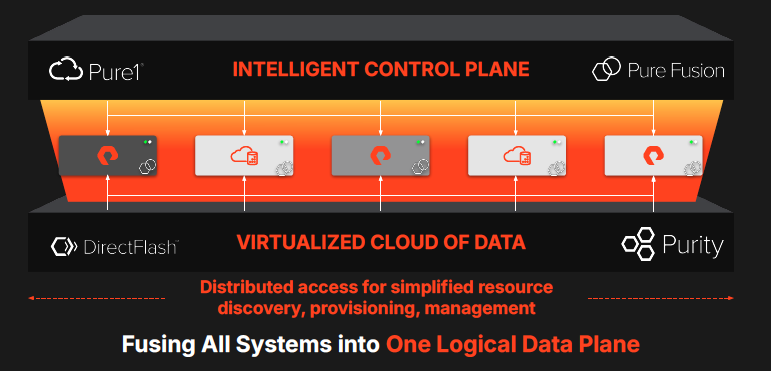Pure Storage Elevates Management and Automation

Pure Storage announced hardware and software products this week aimed at elevating the AI workload capabilities of its storage arrays. The news, delivered at Pure Storage’s Accelerate 2025 event in Las Vegas, marks the latest in a trend among leading datacenter storage providers toward addressing the AI workload requirements of hyperscalers and enterprises.
On the hardware front, Pure announced new products for its FlashArray and FlashBlade series of flash-based products, with an eye to greater storage capacity and performance for complex workloads used in inferencing and other AI tasks.
A new FlashArray//XL R5 now supports object storage as well as files and blocks (FlashArrays were formerly focused on structured workflows); doubles the amount input/output operations per second (IOPS); and increases storage capacity by up to 50%. A new FlashArray//ST, in the vendor’s words, supports “over 10 million IOPS in over five rack units through an optimized IO path.”
Pure has also improved the performance of its FlashBlade storage, which supports unstructured data. For its new FlashBlade//S R2, Pure claims performance “30% greater than competitors across critical workloads like genome sequencing, inference, and electronic design automation simulations, as well as other extensive datasets required for effective AI reasoning.”
Management Software in the Spotlight
But Pure’s greatest emphasis this week was on the software it delivers to manage and automate storage in AI workloads. In this regard, Pure's following a trend among leading storage players such as NetApp and HPE to stress management and automation software in their recent announcements. Storage software providers such as Dell, IBM, and VAST Data also are focused on disaggregating datacenter hardware, including storage devices, into a broader automation cloud.
"It's time to stop managing storage and start managing data,” stated Charles Giancarlo, Chairman and CEO of Pure Storage, in a press release. “With AI increasing the potential value of enterprise data, and cyber-threats imperiling it, data storage architectures and the tools for managing data have not kept pace.”
Pure Storage’s solution is a new Enterprise Data Cloud (EDC) architecture, a platform the vendor says “gives organizations the ability to unify data from across their estate into a virtualized cloud of data that is governed by an intelligent control plane for easy management, and delivered as a service.”
Drawing on Integral Intelligence
EDC is based on Pure Storage’s existing Pure1 and Pure Fusion technologies, with the former acting as an AI-enabled management platform capable of harnessing automation enabled by the latter, including new “preset” functions and remote provisioning. Pure1 and Pure Fusion draw on Purity and DirectFlash, which are software elements governing automation on the vendor’s flash arrays.
The result, Pure says, is an “intelligent control plane,” unifying storage from multiple arrays into a manageable entity, allowing datacenter managers to avoid preplanning and tuning storage deployments, instead ensuring that workloads are assigned the right storage from the start.

Pure Storage's visualization of its "intelligent control plane." Source: Pure Storage
To augment its EDC rollout Pure Storage also announced an AI Copilot to answer a variety of queries on security, performance, sustainability, and support.
Extending Storage Easily Into Workloads
A key function of Pure Storage’s EDC is what the vendor calls workflow orchestration, whereby software connectors for third-party applications from Cisco, Microsoft, VMware, ServiceNow, Slack, and others can be used to create "recipes" that are preset, custom-created, or adapted by Pure partners for storage deployment.
For instance, cloud-native security SaaS vendor Rubrik has leveraged workflow orchestration in its Security Cloud service to tag clean data when threats are detected. CrowdStrike has configured Pure Storage via workflow orchestration to work specifically with its Falcon LogScale security event-logging platform.
The Bigger Picture
This week's announcements should help Pure Storage customers looking for faster, more automated storage for AI workloads. At the same time, Pure faces an enlarging field of competition that, as noted, includes traditional storage players such as NetApp and Dell as well as HPC storage players like DDN. Also competing are vendors VAST Data, WEKA, and others whose emphasis is on managing data as well as storage. It's a challenging market, but Pure Storage has shown this week that it's eager to grab its share.
Futuriom Take: Pure Storage’s announcements this week reflect a broader movement among leading storage players toward faster software-driven management and automation of storage in AI workloads. This in turn requires deeper connections between storage and the disaggregated software used to manage it.






















